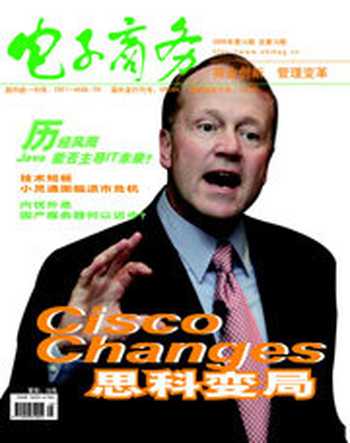英文文摘
Cover Story
Cisco Changes
——Cisco Still Under Pressure Despite Revenue Growth
The bets Cisco Systems Inc. has made on technologies such as voice over IP, security and wireless seem to be paying off as the company reported positive growth for its fourth fiscal quarter recently.
But despite overcoming Wall Street skepticism and posting gains, doubts about continued growth and questions about future tech strategies are keeping the pressure on the networking giant.
Cisco said 2005 fourth-quarter revenue grew 11 percent over the year-ago quarter and 6.4 percent over its third quarter of 2005, reaching $6.6 billion. But Cisco's share price dropped after the San Jose, Calif., company said it expects its first fiscal quarter of 2006 to be up 10 percent over the same quarter in 2005 but slightly below the fourth quarter of 2005.
"They're a victim of the law of large numbers," said Dave Passmore, an analyst at Burton Group, in Sterling, Va. "As you get larger, it's difficult to maintain impressive growth rates. Their primary market is pretty well saturated. They have to keep making bets on new areas."
"Not only are we achieving the No. 1 position in most of our advanced technologies, but we are gaining market share in every advanced-technology area," said Cisco CEO John Chambers, in the earnings call last week.
Special Report
Awakening of Soit
China e-commerce development has gone through trials and hardship for the past ten years. As it returning to reason time, an IT digital fashion pioneer, Soit, appears on the stage of e-commerce with the brand-new appearance, having attracted the extensive concern of the industry immediately.
Management
Outsourcing the Whole Package
——Managing Supplier Partners in the CPG Industry
Outsourcing offers significant potential to CPG and private label companies, enabling them to quickly adapt to changing market needs and keep a flexible and low cost structure, but it also poses risks. While outsourced product development and manufacturing processes can increase the throughput of new products, it can also make compliance difficult and potentially slow time to market, for example. Another issue is the loss of control over the intellectual property around products and visibility into product costs. CPG companies could lose detailed understanding of their products and how they are manufactured, while the outsourcing partner could become positioned to develop competitive product clones.
Product Lifecycle Management, among other critical business processes, is a vital enabler of outsourcing. Most importantly, PLM establishes a centralized repository containing product data and information created by various authoring entities and tools, which is easily accessible by all appropriate parties, including global supplier partners.

